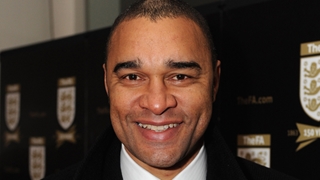
October is Black History Month and to celebrate, The FA hosted a special Q&A to supporting the Paul Canoville Foundation in Hammersmith on Friday 13 October.
Featuring Les Ferdinand, Chris Ramsey and Ricky Hill, pioneering figures from black football, a panel led discussion recognised the contributions of the legendary names in attendance and gave attendees a deeper understanding of what the panelists have achieved through their careers.
Among the star names in attendance at Hammersmith Town Hall were John Barnes, Hope Powell and Paul Elliott.
And Elliott, chair of The FA’s inclusion advisory board, outlines how the organisation is continually working towards helping the game be more inclusive and diverse from the top:-
“The FA has a duty of care. We’re here to serve the game and everybody who loves it. Of course, the FA has had its challenges and will continue to be challenged. But the great thing is there’s a strong will and desire to keep improving. I wouldn’t be here if I didn’t have that confidence.
I want to make a positive contribution. I’ve got a number of positions at Wembley. I’m an ex-officio on The FA Board, I’m on the FA Council, which is the ‘Parliament’ of football, I’m also a member of the Professional Game Board and I represent The FA internationally with UEFA on social responsibility and anti-discrimination. So my hands are full!
The IAB’s role is to check and challenge the FA Board around the inclusion, diversity and equality agenda – we ensure that it runs throughout the veins of the organisation. We’re a support mechanism with specialist practitioners in different areas – equality and diversity, inclusion, disability or faith related issues, LGBT and the women’s game.
Football is such a powerful medium to address so many issues. We try to set the example that the FA is inclusive, it is diverse and in keeping with our message of football For All.
The demographics of society have changed. The FA is clear, and I help lead this agenda, that it’s important the organisation – its structures and values – are reflective of 21st century multi-cultural, multi-racial Britain.
I know from my own journey how things have improved. I was a player in the ugly days. I’ve seen the challenges and that side of football.
Those days were very difficult. It was a society issue. Football was the opportunity for people to maximise their adverse behaviour.
There was no leadership, no legislation, no real role models to set an example back then. It was lonely place. You only had your fellow brethren.
Experiencing those challenges is why I think I’m well placed to comment on the journey and the brilliant work that has been done across the game.
I’ve also seen the evolution and how things have really changed. There has been some brilliant work done across the game, with the FA leading as well as Kick It Out.
Football does take its responsibilities very seriously. A lot of brilliant work is done across the game. I can’t emphasise that enough.
We know where we have to improve. We need more coaches, more visibility. It’s a very long game. But I can say: Look at the journey. Look where we were and where we are now.
We still know where we need to go. We’re constantly evolving all the time."









